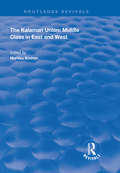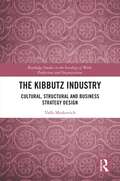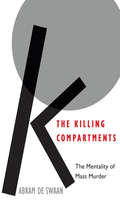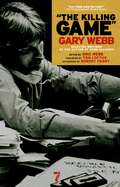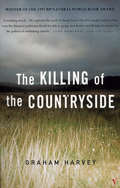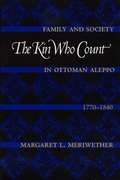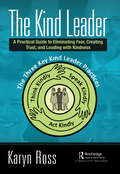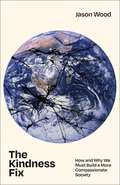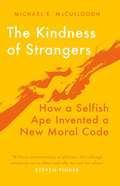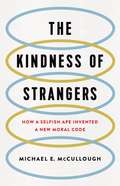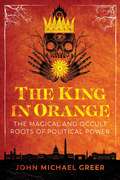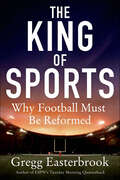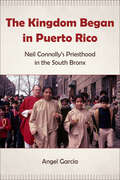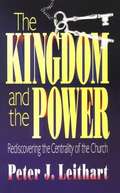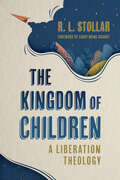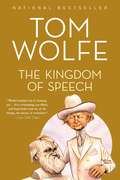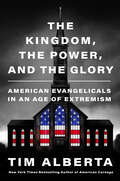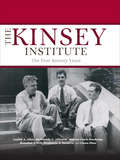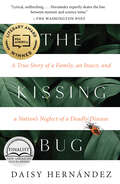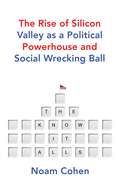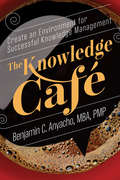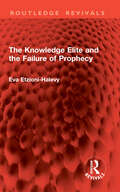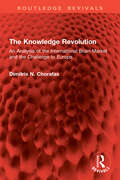- Table View
- List View
The Kalamari Union: Middle Class in East and West (Routledge Revivals)
by Markku KivinenFirst published in 1998, this volume asks: are new social classes in the making in eastern Europe? Are class issues withering away? How do different classes organize their lives, what kind of strategies do they adopt in East and West. Markku Kivinen brings Eastern Europe into the class debate. Recent sociological discussions have touched upon questions of class in Eastern Europe only very provisionally. On the other hand, old analyses of social stratification under conditions of 'actually existed socialism' are no longer relevant in the current situation. This book analyses processes of class relations in Eastern Europe from new theoretical vantage-points, using up-to-date empirical data. Under socialism, power was said to be vested in the working class. However, there was a constant tension between the 'holy proletariat' and the real life of the working class. Today, all political forces in Eastern Europe; leftist and liberal alike, are hankering for the middle class. This book explores the real processes in both East and West. This leads to more concrete political and even moral issues. The new 'sacred middle class' is challenged. The contributors adopt several conceptual approaches and perspectives which enter into a fruitful exchange in this book.
The Kennedy Imprisonment: A Meditation on Power
by Garry WillsFor more than a decade, The Kennedy Imprisonment has stood as the definitive historical and psychological analysis of the Kennedy clan and its crippling conception of power.
The Kibbutz Industry: Cultural, Structural and Business Strategy Design (Routledge Studies in the Sociology of Work, Professions and Organisations)
by Yaffa MoskovichThis book examines the changes in many kibbutz factories which have recently transformed from socialist entities, with egalitarian and cooperative relationships, to hierarchical and market-driven structures. Focusing on five case studies from an ethnographic perspective, the book explores the reasons for this organizational change and examines its ideological, social, and economic causes. Ranging from organizational culture as a tool for economic success to the cooperative clan lifestyle and its organizational experience for improving human life and economic production, the author uncovers and investigates various hidden layers of the organizational culture in the kibbutz, revealing that cultural change in the factories was intended as a way of coping with a changing competitive environment. Adding new typologies for familial business types, demonstrating how hybrid organizational structures have promoted economic success, and examining the lesser-studied communal perspective, it shows how social development can be used to provide a deeper analysis of the kibbutz industry as a microcosm of the changes in communal lifestyle that have recently shifted toward materialism and capitalism. As such, The Kibbutz Industry will appeal to scholars and students with interests in the sociology of organization, business studies, human resource management, and organizational behavior.
The Killing Compartments
by Abram De SwaanThe twentieth century was among the bloodiest in the history of humanity. Untold millions were slaughtered. How people are enrolled in the service of evil is a question that continues to bedevil. In this trenchant book, Abram de Swaan offers a taxonomy of mass violence that focuses on the rank-and-file perpetrators, examining how murderous regimes recruit them and create what De Swaan calls the "killing compartments” that make possible the worst abominations without apparent moral misgiving, without a sense of personal responsibility, and, above all, without pity. De Swaan wonders where extreme violence comes from and where it goes#151;seemingly without a trace#151;when the wild and barbaric gore is over. And what about the perpetrators themselves? Are they merely and only the product of external circumstance? Or is there something in their makeup that disposes them to become mass murderers? Drawing on a wide range of disciplines, including sociology, anthropology, political science, history, and psychology, De Swaan sheds new light on an urgent and intractable pathology that continues to poison peoples all over the world.
The Killing Game
by Gary WebbGary Webb had an inborn journalistic tendency to track down corruption and expose it. For over thirty-four years, he wrote stories about corruption from county, state, and federal levels. He had an almost magnetic effect to these kinds of stories, and it was almost as if the stories found him. It was his gift, and, ultimately, it was his downfall.He was best known for his story Dark Alliance, written for the San Jose Mercury News in 1996. In it Webb linked the CIA to the crack-cocaine epidemic in Los Angeles during the Iran Contra scandal. His only published book, Dark Alliance is still a classic of contemporary journalism. But his life consisted of much more than this one story, and The Killing Game is a collection of his best investigative stories from his beginning at the Kentucky Post to his end at the Sacramento News & Review. It includes Webb's series at the Kentucky Post on organized crime in the coal industry, at the Cleveland Plain Dealer on Ohio State's negligent medical board, and on the US military's funding of first-person shooter video games. The Killing Game is a dedication to his life's work outside of Dark Alliance, and it's an exhibition of investigative journalism in its truest form.
The Killing Of The Countryside
by Graham HarveyOver then past fifty years the British countryside has changed out of all recognition. A wide range of wildlife species are disappearing - victims of modern intensive farming, of pesticides and fertilisers and the sheer relentless pressure to maximise output from every hedge bank and field corner. It need not have happened. The loss of our wildlife and countryside has come about through a deliberate and sustained national policy, one that costs the British people 8 billion a year. The Killing of the Countryside is a devastating attack on modern British agricultural policy and practice and a plea for a return to natural cycles, an end to subsidies and the domination of agribusiness, and for a safe, sustainable farming system.Winner of the 1997 BP Natural World Book Award.
The Kin Who Count: Family and Society in Ottoman Aleppo, 1770-1840
by Margaret L. MeriwetherThe history of the Middle Eastern family presents as many questions as there are currently answers. Who lived together in the household? Who married whom and for how long? Who got a piece of the patrimonial pie? These are the questions that Margaret Meriwether investigates in this groundbreaking study of family life among the upper classes of the Ottoman Empire in the pre-modern and early modern period. Meriwether recreates Aleppo family life over time from records kept by the Islamic religious courts that held jurisdiction over all matters of family law and property transactions. From this research, she asserts that the stereotype of the large, patriarchal patrilineal family rarely existed in reality. Instead, Aleppo's notables organized their families in a great diversity of ways, despite the fact that they were all members of the same social class with widely shared cultural values, acting under the same system of family law. She concludes that this had important implications for gender relations and demonstrates that it gave women more authority and greater autonomy than is usually acknowledged.
The Kind Leader: A Practical Guide to Eliminating Fear, Creating Trust, and Leading with Kindness
by Karyn RossKindness and leadership aren’t often synonymous. Ask someone to describe "good leadership" to you and you will hear many adjectives used: authentic, bold, challenging, charismatic, decisive, empowering, fearless, goal-oriented, humble, inspiring, original, passionate, role-model, strategic and transparent, to name of a few. And though there are many more that come to mind, kindness isn’t one of them. And here’s the problem with that. Leaders lead. And the way a leader leads – how they do what they do – influences those they lead. From the president of the country, to the president of a company, from middle managers, right down to front-line supervisors, what a leader models – how they think, speak and act – influences the people they lead. Leaders who think, speak and act unkindly give legitimacy and permission to those they lead to think, speak, and act in exactly the same unkind ways. Today, in a world where a leaders’ words and actions travel quickly through social media channels such as Twitter, their influence – unkind or kind – is amplified through repeated views and sharing. In an increasingly fragmented, polarized and divided world, we need leaders who will bring people together not divide them. Leaders who value and model cooperation and collaboration over competition. And who model ways to think kindly, speak kindly and act kindly. We need kindness to become synonymous with good leadership. So that when someone is asked to describe the traits of a good leader, kindness will be the first word that comes to mind. Essentially, the purpose of this book is to teach leaders how to lead with kindness so they can influence the people they lead to create kinder workplaces, organizations and the world. Each chapter contains a mixture of theory, case studies and reflections from leaders and the people they influence. As well, the book follows the fictional stories of Kay’La Janson and Kevin Landrell, as they become leaders in a failing organization that is ultimately turned around through kind leadership. Between chapters there are a series of practical exercises based on concepts presented in the previous chapter with space to record outcomes and reflections on the practice process. This book gives you a deep theoretical understanding of the importance of leading with kindness and also provides practical exercises for you to use to turn theory into practice. Because "change means doing things differently," and because we only really "learn by doing" to create kinder organizations, kinder communities and a kinder world, leaders must be able to begin practicing kindness right away. By the time you finish the book, you will feel confident in your ability to lead with kindness and also to address organizational problems at work, at home and in the community, with kindness.
The Kind Leader: A Practical Guide to Eliminating Fear, Creating Trust, and Leading with Kindness
by Karyn RossKindness and leadership aren’t often synonymous. Ask someone to describe "good leadership" to you and you will hear many adjectives used: authentic, bold, challenging, charismatic, decisive, empowering, fearless, goal-oriented, humble, inspiring, original, passionate, role-model, strategic and transparent, to name of a few. And though there are many more that come to mind, kindness isn’t one of them. And here’s the problem with that. Leaders lead. And the way a leader leads – how they do what they do – influences those they lead. From the president of the country, to the president of a company, from middle managers, right down to front-line supervisors, what a leader models – how they think, speak and act – influences the people they lead. Leaders who think, speak and act unkindly give legitimacy and permission to those they lead to think, speak, and act in exactly the same unkind ways. Today, in a world where a leaders’ words and actions travel quickly through social media channels such as Twitter, their influence – unkind or kind – is amplified through repeated views and sharing. In an increasingly fragmented, polarized and divided world, we need leaders who will bring people together not divide them. Leaders who value and model cooperation and collaboration over competition. And who model ways to think kindly, speak kindly and act kindly. We need kindness to become synonymous with good leadership. So that when someone is asked to describe the traits of a good leader, kindness will be the first word that comes to mind. Essentially, the purpose of this book is to teach leaders how to lead with kindness so they can influence the people they lead to create kinder workplaces, organizations and the world. Each chapter contains a mixture of theory, case studies and reflections from leaders and the people they influence. As well, the book follows the fictional stories of Kay’La Janson and Kevin Landrell, as they become leaders in a failing organization that is ultimately turned around through kind leadership. Between chapters there are a series of practical exercises based on concepts presented in the previous chapter with space to record outcomes and reflections on the practice process. This book gives you a deep theoretical understanding of the importance of leading with kindness and also provides practical exercises for you to use to turn theory into practice. Because "change means doing things differently," and because we only really "learn by doing" to create kinder organizations, kinder communities and a kinder world, leaders must be able to begin practicing kindness right away. By the time you finish the book, you will feel confident in your ability to lead with kindness and also to address organizational problems at work, at home and in the community, with kindness.
The Kindness Fix: How and Why We Must Build a More Compassionate Society
by Jason WoodIf a measure of our humanity is how we treat the most vulnerable, our report card is bleak. Our politics is divided, people in need are too often treated with cruelty, and the systems we built to support others are creaking. Welfare too often fails, sometimes with tragic consequences. Yet, the help we give to others can be more effective, more accepted, and more just if we cultivate greater levels of compassion to put it at the heart of public life and potentially resolve these challenges. In this book, Jason Wood reviews the research and talks to experts from across the world to make the moving case for greater compassion in public life.
The Kindness of Strangers: How a Selfish Ape Invented a New Moral Code
by Michael E. McCulloughWhy do we give a damn about strangers? Altruism is unique to the human species. It is also one of the great evolutionary puzzles, and we may be on the brink of solving it. It turns out that, over the last 12,000 years, we have become more and more altruistic. This is despite the fact that, the majority of the time, our minds are still breathtakingly indifferent to the welfare of others. In solving the enigma of generosity in a world of strangers, McCullough takes us on a sweeping history of society and science to warn that, if we are not careful, our instincts and sympathies have as much potential for harm as for good. The bad news is that we are not designed to be kind. The good news is that we can push ourselves to be kind anyway, together.
The Kindness of Strangers: How a Selfish Ape Invented a New Moral Code
by Michael E. McCulloughA sweeping psychological history of human goodness -- from the foundations of evolution to the modern political and social challenges humanity is now facing. How did humans, a species of self-centered apes, come to care about others? Since Darwin, scientists have tried to answer this question using evolutionary theory. In The Kindness of Strangers, psychologist Michael E. McCullough shows why they have failed and offers a new explanation instead. From the moment nomadic humans first settled down until the aftermath of the Second World War, our species has confronted repeated crises that we could only survive by changing our behavior. As McCullough argues, these choices weren't enabled by an evolved moral sense, but with moral invention -- driven not by evolution's dictates but by reason. Today's challenges -- climate change, mass migration, nationalism -- are some of humanity's greatest yet. In revealing how past crises shaped the foundations of human concern, The Kindness of Strangers offers clues for how we can adapt our moral thinking to survive these challenges as well.
The King in Orange: The Magical and Occult Roots of Political Power
by John Michael Greer• Details the magical war that took place behind the scenes of the 2016 election • Examines in detail the failed magical actions of Trump&’s opponents, with insights on political magic from Dion Fortune&’s war letters • Reveals the influence of a number of occult forces from Julius Evola to chaos magick to show how the political and magical landscape of American society has permanently changed since the 2016 election Magic and politics seem like unlikely bedfellows, but in e King in Orange, author John Michael Greer goes beyond super cial memes and extreme partisanship to reveal the unmentionable realities that spawned the unexpected presidential victory of an elderly real-estate mogul turned reality-TV star and which continue to drive the deepening divide that is now the de ning characteristic of American society. Greer convincingly shows how two competing schools of magic were led to contend for the presidency in 2016 and details the magical war that took place behind the scenes of the campaign. rough the in uence of a number of occult forces, from Julius Evola to chaos magicians as well as the cult of positive thinking, Greer shows that the main contenders in this magical war were the status quo magical state--as de ned by the late scholar Ioan Couliano--which has repurposed the &“manipulative magic&” techniques of the Renaissance magi into the subliminal techniques of modern advertising, and an older, deeper, and less reasonable form of magic--the &“magic of the excluded&”--which was employed by chaos magicians and alt-right internet wizards, whose desires coalesced in the form of a frog avatar that led the assault against the world we knew. Examining in detail the magical actions of Trump&’s opponents, with insights on political magic from occultist Dion Fortune&’s war letters, the author discusses how the magic of the privileged has functioned to keep the comfortable classes from being able to respond e ectively to the populist challenge and how and why the &“Magic Resistance,&” which tried to turn magic against Trump, has failed. Showing how the political and magical landscape of American society has permanently changed since the 2016 election cycle, Greer reveals that understanding the coming of the King in Orange will be a crucial step in making sense of the world for a long time to come.
The King of Sports: Why Football Must Be Reformed
by Gregg EasterbrookGridiron football is the king of sports – it's the biggest game in the strongest and richest country in the world. In The King of Sports, Easterbrook tells the full story of how football became so deeply ingrained in American culture. Both good and bad, he examines its impact on American society.The King of Sports explores these and many other topics:* The real harm done by concussions (it's not to NFL players).* The real way in which college football players are exploited (it's not by not being paid).* The way football helps American colleges (it's not bowl revenue) and American cities (it's not Super Bowl wins).* What happens to players who are used up and thrown away (it's not pretty).* The hidden scandal of the NFL (it's worse than you think).Using his year-long exclusive insider access to the Virginia Tech football program, where Frank Beamer has compiled the most victories of any active NFL or major-college head coach while also graduating players, Easterbrook shows how one big university "does football right." Then he reports on what's wrong with football at the youth, high school, college and professional levels. Easterbrook holds up examples of coaches and programs who put the athletes first and still win; he presents solutions to these issues and many more, showing a clear path forward for the sport as a whole.
The Kingdom Began in Puerto Rico: Neil Connolly's Priesthood in the South Bronx
by Angel Garcia&“A story of how a priest struggled to live the call of the Second Vatican Council, and . . . worked alongside laypeople for social justice in the Bronx.&” ―National Catholic Reporter South Bronx, 1958. Change was coming. It was a unique place and time in history where Father Neil Connolly found his true calling and spiritual awakening. Set in the context of a changing world and a changing Catholic Church, The Kingdom Began in Puerto Rico follows Fr. Neil Connolly&’s path through the South Bronx, which began with a special Church program to address the postwar great Puerto Rican migration. After an immersion summer in Puerto Rico, Fr. Neil served the largest concentration of Puerto Ricans in the Bronx from the 1960s to the 1980s as they struggled for a decent life. Through the teachings of Vatican II, Connolly assumed responsibility for creating a new Church and world. In the war against drugs, poverty, and crime, he created a dynamic organization and chapel run by the people, and supported Unitas, a unique peer-driven mental health program for youth. Frustrated by the lack of institutional responses to his community&’s challenges, he challenged government abandonment and spoke out against ill-conceived public plans. Ultimately, he realized that his priestly mission was in developing new leaders among people, in the Church and the world, and supporting two pioneering lay leadership programs, the Pastoral Center and People for Change. Angel Garcia ably blends the dynamic forces of Church and world that transformed Fr. Connolly as he grew into his vocation. This book presents a rich history of the South Bronx and calls for all urban policies to begin with the people. It also affirms the continuing relevance of Vatican II and Medellin for today&’s Church and world, in the US and Latin America. &“Garcia captures the spirit of the era, and the spirit of the man.&” —James Martin, S.J., author of Jesus: A Pilgrimage
The Kingdom and the Power: Rediscovering the Centrality of the Church
by Peter J. LeithartTo some extent, our perception of the church's present task depends largely on our perception of the current state of our civilization.If American Christians are victims of a vicious elite, working to regain the levers of power might seem a sensible strategy. If, however, American culture is a mess because the church is a mess, then the most sensible strategy would be to begin with the reform of the church. The World is trying to experiment with attempting to form a civilized but non-Christian mentality.
The Kingdom of Children: A Liberation Theology
by R. L. StollarEmpower the children in your faith community. Children are marginalized in our churches, dismissed into Sunday school or silenced for lengthy sermons aimed at adults. R. L. Stollar has spent his career advocating for the rights of children, and he thinks it&’s time to stop talking down to children and start listening to them.In The Kingdom of Children, Stollar proposes a liberation theology of the child. Stollar begins with a theoretical framework that centers children in our theology and ecclesial life. Reframing biblical stories to center children, we can see how the binding of Isaac reflects the spiritual effects of child abuse, or how children like Miriam can serve as leaders in their communities. Using scriptural examples as well as real studies of children&’s spiritual lives, Stollar asserts that children can be priests, prophets, and theologians in our communities. Each chapter concludes with activities and discussion points for introducing the book&’s concepts to children.The Kingdom of Children is a must-read for youth ministers, parents, and anyone who works with children. By embracing the liberation of children, we can avoid stunting their spiritual growth and passing on trauma. And when we lift up children—truly value and learn from them—we build up the kingdom of God here in our communities.
The Kingdom of Speech
by Tom Wolfe<P>The maestro storyteller and reporter provocatively argues that what we think we know about speech and human evolution is wrong. <P>Tom Wolfe, whose legend began in journalism, takes us on an eye-opening journey that is sure to arouse widespread debate. THE KINGDOM OF SPEECH is a captivating, paradigm-shifting argument that speech--not evolution--is responsible for humanity's complex societies and achievements. <P>From Alfred Russel Wallace, the Englishman who beat Darwin to the theory of natural selection but later renounced it, and through the controversial work of modern-day anthropologist Daniel Everett, who defies the current wisdom that language is hard-wired in humans, Wolfe examines the solemn, long-faced, laugh-out-loud zig-zags of Darwinism, old and Neo, and finds it irrelevant here in the Kingdom of Speech. <P><b>A New York Times Bestseller</b>
The Kingdom, the Power, and the Glory: American Evangelicals in an Age of Extremism
by Tim AlbertaThe award-winning journalist and staff writer for The Atlantic follows up his New York Times bestseller American Carnage with this timely, rigorously reported, and deeply personal examination of the divisions that threaten to destroy the American evangelical movement. <p><p> Evangelical Christians are perhaps the most polarizing—and least understood—people living in America today. In his seminal new book, The Kingdom, the Power, and the Glory, journalist Tim Alberta, himself a practicing Christian and the son of an evangelical pastor, paints an expansive and profoundly troubling portrait of the American evangelical movement. Through the eyes of televangelists and small-town preachers, celebrity revivalists and everyday churchgoers, Alberta tells the story of a faith cheapened by ephemeral fear, a promise corrupted by partisan subterfuge, and a reputation stained by perpetual scandal. <p><p> For millions of conservative Christians, America is their kingdom—a land set apart, a nation uniquely blessed, a people in special covenant with God. This love of country, however, has given way to right-wing nationalist fervor, a reckless blood-and-soil idolatry that trivializes the kingdom of Jesus Christ. Alberta retraces the arc of the modern evangelical movement, placing political and cultural inflection points in the context of church teachings and traditions, explaining how Donald Trump's presidency and the COVID-19 pandemic only accelerated historical trends that long pointed toward disaster. Reporting from half-empty sanctuaries and standing-room-only convention halls across the country, the author documents a growing fracture inside American Christianity and journeys with readers through this strange new environment in which loving your enemies is "woke" and owning the libs is the answer to WWJD. <p><p> Accessing the highest echelons of the American evangelical movement, Alberta investigates the ways in which conservative Christians have pursued, exercised, and often abused power in the name of securing this earthly kingdom. He highlights the battles evangelicals are fighting—and the weapons of their warfare—to demonstrate the disconnect from scripture: Contra the dictates of the New Testament, today's believers are struggling mightily against flesh and blood, eyes fixed on the here and now, desperate for a power that is frivolous and fleeting. Lingering at the intersection of real cultural displacement and perceived religious persecution, Alberta portrays a rapidly secularizing America that has come to distrust the evangelical church, and weaves together present-day narratives of individual pastors and their churches as they confront the twin challenges of lost status and diminished standing. <p><p> Sifting through the wreckage—pastors broken, congregations battered, believers losing their religion because of sex scandals and political schemes—Alberta asks: If the American evangelical movement has ceased to glorify God, what is its purpose? <p> <b>New York Times Bestseller</b>
The Kinsey Institute: The First Seventy Years (Well House Bks.)
by Judith A. Allen Andrew Clark-Huckstep Brandon J. Hill Hallimeda E. Allinson Liana Zhou Stephanie A. SandersAn in-depth history of Alfred Kinsey&’s groundbreaking Institute for Sex Research and the cultural awakening it inspired in America—&“it has no rival&” (Angus McLaren). While teaching a course on Marriage and Family at Indiana University, biologist Alfred Kinsey noticed a surprising dearth of scientific literature on human sexuality. He immediately began conducting his own research into this important yet neglected field of inquiry, and in 1947, founded the Institute for Sex Research as a firewall against those who opposed his work on moral grounds. His frank and dispassionate research shocked America with the hidden truths of our own sex lives, and his two groundbreaking reports —Sexual Behavior in the Human Male (1948) and Sexual Behavior in the Human Female (1953)—both became New York Times bestsellers. In The Kinsey Institute: The First Seventy Years, Judith A. Allen and her coauthors provide an in-depth history of Kinsey&’s groundbreaking work and explore how the Institute has continued to make an impact on our culture. Covering the early years of the Institute through the &“Sexual Revolution,&” into the AIDS pandemic of the Reagan era, and on into the &“internet hook-up&” culture of today, the book illuminates the Institute&’s enduring importance to society.
The Kissing Bug: A True Story Of A Parasite And A Nation's Neglect Of A Deadly Disease
by Daisy HernándezWinner of the PEN/Jean Stein Book Award National Book Foundation Science + Literature Selection Finalist for New American Voices Award and Lammy Award for Bisexual Nonfiction A TIME, NPR, Chicago Public Library, Science for the People, WYNC, WBUR Radio Boston, and The Stacks Podcast Best Book of the Year Longlisted for the PEN Open Book Award As heard on Fresh Air Growing up in a New Jersey factory town in the 1980s, Daisy Hernández believed that her aunt had become deathly ill from eating an apple. No one in her family, in either the United States or Colombia, spoke of infectious diseases. Even into her thirties, she only knew that her aunt had died of Chagas, a rare and devastating illness that affects the heart and digestive system. But as Hernández dug deeper, she discovered that Chagas?or the kissing bug disease?is more prevalent in the United States than the Zika virus. After her aunt’s death, Hernández began searching for answers. Crisscrossing the country, she interviewed patients, doctors, epidemiologists, and even veterinarians with the Department of Defense. She learned that in the United States more than three hundred thousand people in the Latinx community have Chagas, and that outside of Latin America, this is the only country with the native insects?the “kissing bugs”?that carry the Chagas parasite. Through unsparing, gripping, and humane portraits, Hernández chronicles a story vast in scope and urgent in its implications, exposing how poverty, racism, and public policies have conspired to keep this disease hidden. A riveting and nuanced investigation into racial politics and for-profit healthcare in the United States, The Kissing Bug reveals the intimate history of a marginalized disease and connects us to the lives at the center of it all.
The Know-It-Alls: The Rise of Silicon Valley as a Political Powerhouse and Social Wrecking Ball
by Noam CohenThe world&’s tech giants are at the centre of controversies over fake news, free speech and hate speech on platforms where influence is bought and sold. Yet, at the outset, almost everyone thought the internet would be a positive, democratic force, a space where knowledge could be freely shared to enable everyone to make better-informed decisions. How did it all go so wrong? Noam Cohen reports on the tech libertarians of Silicon Valley, from the self-proclaimed geniuses Jeff Bezos, Peter Thiel, Reid Hoffman and Mark Zuckerberg to the early pioneers at Stanford University, who have not only made the internet what it is today but reshaped society in the process. It is the story of how the greed, bias and prejudice of one neighbourhood is fracturing the Western world.
The Knowledge Café: Create an Environment for Successful Knowledge Management
by Benjamin AnyachoKnowledge Café is a process for sharing information, whether face to face or virtual. This popular and practical knowledge management tool supports a culture where projects and innovation thrive.The Knowledge Café is a mindset and environment for engaging, discussing, and exchanging knowledge within a group either face to face or virtually. At the café, participants can discuss hard-to-solve project issues or resolve a family or community crisis. This metaphorical town square supports knowledge circulation and rejuvenation and increases its velocity—making it a breeding ground for innovation. The aha moments at one Knowledge Café can match the benefits of multiple conferences, workshops, and training put together.When knowledge management (KM) is part of an organization's culture, performance improves, collaboration increases, and the competitive advantage accelerates. No one can force knowledge transfer. We must create the right environment where knowledge is freely shared, rewarded, and fun. This book demonstrates why the Knowledge Café is such an effective KM tool and shows how to design optimal café experiences and increase learning agility. The premium on knowledge and agility has never been greater. This book offers a technique for managing knowledge toward the greater good. Tips; templates; practical and relatable experiences; case studies; and examples of knowledge brokers, creators, and sharers across cultures are sprinkled throughout the book to show how the café interfaces with other KM techniques and in different work and project spaces.
The Knowledge Elite and the Failure of Prophecy (Routledge Revivals)
by Eva Etzioni-HalevyFirst published in 1985, The Knowledge Elite and the Failure of Prophecy presents a demystification of the role of the Knowledge Elite, or the role many intellectuals have purported to play in modern, Western, society. The author debunks their role as self-proclaimed prophets in charge of foretelling (or ‘forecasting’ as it is more fashionably called) things to come and in charge of guiding society towards a better future – devised by themselves. Scholars who have converged on the idea of the ‘post-industrial’ society have argued that the theoretical knowledge provided by what they call the Knowledge Class has been more useful than ever in guiding society towards greater rationality, affluence, equity, and liberty. In contrast, this book presents the argument that it is precisely in these years that the benefits of the knowledge provided by intellectuals have petered out, that its dubious and even harmful effects have become more prominent, and that the knowledge provided by intellectuals has been instrumental in helping to bring about a more confused society – a society increasingly incapable of coping with its mounting problems.This is a book on intellectuals, for intellectuals, by an intellectual. It is a book of social commentary, critique, and polemic. It is designed not to please, but to challenge intellectuals and to provoke counter-critique and controversy.
The Knowledge Revolution: An Analysis of the International Brain Market and the Challenge to Europe (Routledge Revivals)
by Dimitris N. ChorafasFirst published in 1968, The Knowledge Revolution has been written to discuss Europe’s economic and cultural future against the whole background of the world market for brains. It examines the role of industry, governments, and universities in meeting the challenge of the 1970s and thereafter. The realization that a modern economy's most important capital resource is not money, raw materials or equipment but brains has been slow in coming. This fact is the kernel of the Knowledge Revolution.There has been tremendous discussion both about the brain drain and about the American “takeover” of European industries. This book is the first to treat these phenomena as merely symptoms of the basic causes of European decay. Where others have concentrated on individual aspects of the problems faced by Europe, Professor Chorafas effectively examines the whole complex picture of the European malaise. Professor Chorafas maintains that Europe must take advantage of mass production and mass markets; and he not only advocates large scale pan-European industrial co-operation but also original methods of financing it. Although his attention is directed towards the economic future, he has not ignored cultural values. The book is mainly concerned with Continental Europe, Scandinavia and the USA, but the special problems of the Middle East and the developing territories are also discussed. This important historical reference work will be of interest to statemen, industrialists, academics, economists, and civil servants.
